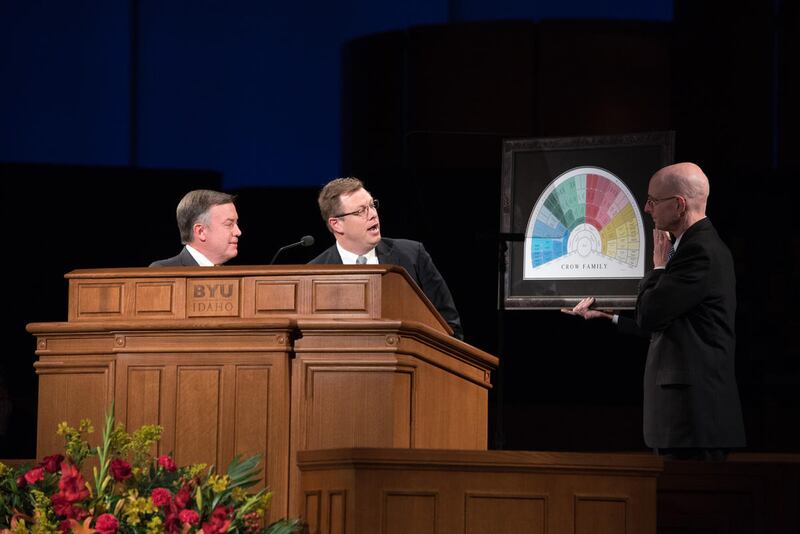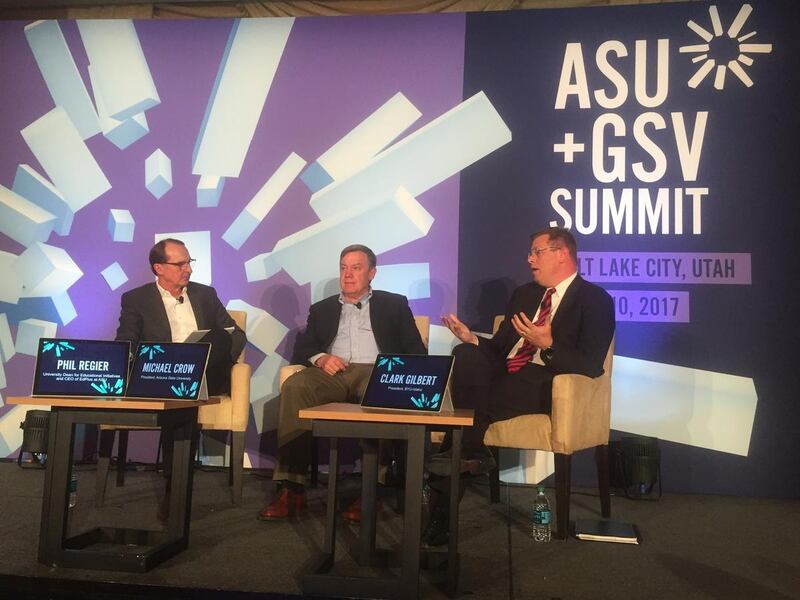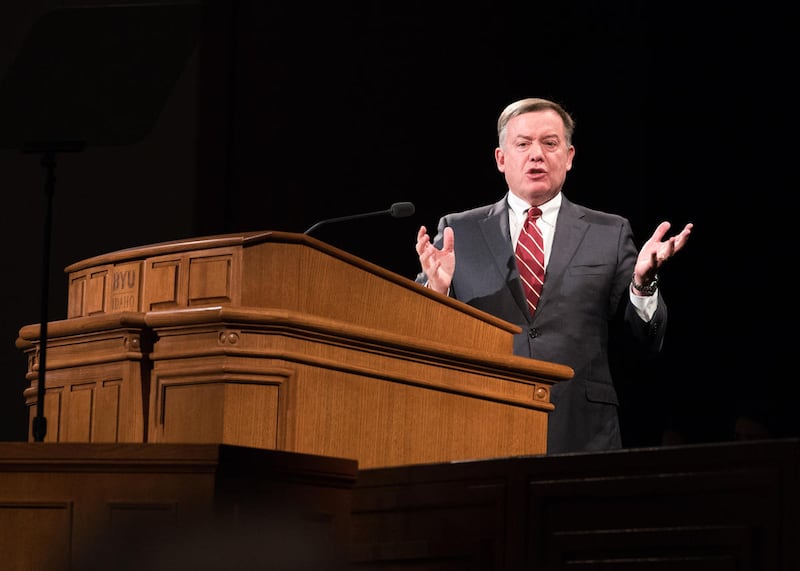REXBURG, Idaho — BYU-Idaho and BYU-Pathway Worldwide will funnel more Mormon students to Arizona State University through a unique public-parochial partnership announced Tuesday.
The formal agreement allows students at the two LDS Church-owned schools to use two new paths to transfer seamlessly to ASU for access to a broader array of degrees.
"It makes it a lot easier for our students, especially those in Arizona," BYU-PW President Clark Gilbert said.
The deal strengthens the ties between ASU and BYU-Idaho and BYU-Pathway Worldwide, which are owned and operated by The Church of Jesus Christ of Latter-day Saints. Those ties were underscored Tuesday when ASU President Michael Crow gave the first BYU-Idaho devotional ever delivered by someone who is not a Mormon.
The new agreement feeds Crow's voracious appetite for more growth at ASU, already the nation's largest public school with 72,000 students, while helping students at the BYU schools, which despite their own craving for international online expansion face caps in campus enrollment and degree offerings.
"This is just the beginning," Crow said. "We're looking at this as a way we can reach more people, educate more people, do so more efficiently and at lower cost without any reduction in quality or rigor or outcome. We share all of the same objectives."
How it works
Review teams at the three schools went through the BYU programs' offerings course by course to determine what credits ASU could accept via transfer. The result is that BYU-PW and BYU-I students now can transfer to the Tempe-based school in one of two new ways.
First, the Guaranteed Program for Admission is designed for students with a minimum 2.5 grade-point average in 24-to-60 transferable lower-division credits. The program will ensure that students know what courses transfer and apply to ASU degrees.
Second, BYU-Idaho students who complete an associate of applied science degree will receive 60 credits in transfer toward a complementary bachelor of applied science degree at ASU. That means BYU-I students who transfer to ASU with an associate degree will require a maximum of 60 additional credits to complete their bachelor degree at ASU.
Crow said the agreement is a step toward repairing a problem in American higher education.
"In the past there have been barriers put in place between and among LDS institutions, LDS education enterprises, and other secular institutions," he said. "It's really unfortunate, so I've been trying to correct what I think was a wrong."
LDS Church leadership has made it clear for years that BYU-Idaho is committed to quality undergraduate education and will not expand its curriculum or degree offerings.
"As best we can tell, we'll never have graduate programs," BYU-Idaho President Henry J. Eyring said. "
"It's important for us be making friends and connections and creating pipelines to institutions which have a broader mandate than we do."
ASU offers more than 300 majors and more than 150 online degree programs. BYU-Idaho offers 88 bachelor degrees and 21 associate degrees. BYU-Idaho online offers 12 certificate programs, six associate degrees and 11 bachelor degrees.
New pathways
LDS leaders believe more church members need higher education in a rapidly changing global economy. They announced BYU-Pathway Worldwide in February to build on the rapid success of Pathway program, a one-year program designed to give students confidence and skills necessary to succeed in college. Credits cost $69 per hour. Students who complete the program with good grades can enroll in BYU-Idaho online programs for the same discounted price.
Pathway combines online courses with weekly gatherings in over 400 locations around the world, including the Phoenix metropolitan area.
In addition to BYU-I online courses, Gilbert said, "everywhere we are in the world we want our students to go into local options, too. A high percentage of Pathway students go on to do that. What Michael has done has made it easier for many to go to ASU."
Arizona is home to 423,000 Mormons — more than every state but Utah, California and Idaho. Nearly 2,000 students attend Pathway programs in Arizona.
"We want a lot of them to start with us, get a certificate and then finish a degree at ASU, or start with us and get an associate's through BYU-Idaho, then finish a bachelor's degree at ASU," Gilbert said.
"That will send President Crow some great students and give our students more options where they live."
BYU-PW has similar agreements in other parts of the world, like one with Galileo University in Guatemala.
Unique devotional
Crow has courted Mormon students since he became ASU's president in 2002. Soon after, he met with then-LDS Church President Gordon B. Hinckley to encourage church leaders to keep their Institute of Religion building on ASU's campus.
"President Crow is a great friend of the church, and of people of all faiths," Eyring said as he introduced Crow at Tuesday's devotional. "He's also a great supporter of BYU-Idaho. He has inspired confidence in our innovations, both on campus and online."
Crow has studied LDS history and is known to tell Mormons, "If you aren't committed to education, you don't understand your own faith."
Crow spoke to 5,210 students at the BYU-Idaho Center for 25 minutes on Tuesday, telling them that LDS leaders always have taught what Brigham Young called "the principle of improvement."
BYU-Idaho's administration asked students to come to the devotional thinking about questions from Crow: "What is the most complicated object in the universe, and what are you going to do with it, since it lives with you?"
He said each human brain is unique and has unlimited potential. Too many people underestimate themselves and their capacity, he said.
"A human being in the right circumstances can learn anything," Crow said, adding that everyone should understand they've been given a unique blessing based on their very existence.
"There has never been brain like yours," he said. "There never will be a brain like yours again. It's more complex than the universe itself. Your brain is the ultimate quantum processing machine. It has no limits. Just as God has no limits."
He recommended that as students think about their "unbelievable gift," they recognize that they are responsible for their decisions they make about what to do with it. He also said they should recognize that it obligates them to lifelong learning about their faith, God, God's creation and who they are.
"Take this unique object and move it forward," he said.
Deep relationship
Gilbert and Eyring consider Crow a friend.
"All three of us believe in human potential, young people learning and education as a pathway," Crow said in an interview immediately after the devotional. "At ASU we've created an environment where you can attend a secular university and attend the LDS Institute and have the duality of your learning experience to help you evolve."
ASU has an on-campus mosque and Crow said he has attended multiple interfaith campus meetings at the LDS Institute.
"We have a very diverse community of the free expression of faith on campus," he said. "The bias used to be, 'Well, we're a public university, we're to have nothing to do with any religious group, whatsoever.' ... It was like an exaggerated overprotectiveness that become somewhat of a bias. We're trying to make a correction to an overexaggerated response."
Gilbert said ASU demonstrated its even-handedness when its religion faculty reviewed BYU-Pathway's and BYU-Idaho's religion courses. He was pleasantly surprised when they determined most of the courses met ASU's transfer requirements.
Gilbert endorsed ASU.
"We think ASU's a wonderful environment for those students to do well in because it's so welcoming," he said, "not only to people of our faith but to people of all faiths."





